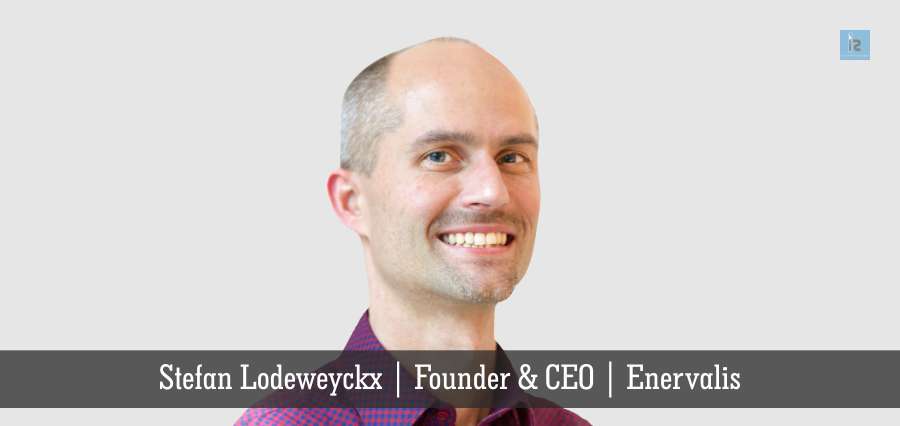The field of green energy holds some of the most exciting opportunities any entrepreneur could wish for. Several of the world’s largest companies are currently exploring its almost limitless possibilities. Joining them are a number of innovative startups also pushing the boundaries of what Man can achieve with altruistic motivations.
The ideal example of this philosophy is Enervalis.
Walking the Walk
Enervalis was founded by Stefan Lodeweyckx, the CEO in 2013. Stefan is an accomplished digital electronics engineer who has always had a passion for green technology and environmentalism.
Unlike the typical C-suite executive, he doesn’t live in a palatial complex of glass-and-steel. Instead, his family of six resides in an old house they are renovating and are evolving to a completely fossil fuels free consumption pattern. Stefan himself is an avid gardener and as much as time allows, he grows together with his wife much of the fresh food they consume.
“Years ago, I began to wonder what I would say when my children were grown and asked me what I had done for society,” he reveals, “I realized that, at that time, the answer would be ‘Nothing’.”
Stefan was already a renowned digital engineer who had spent almost two decades leading large teams at major corporations like Sony and Philips. Not content to excel in just a single field, he also earned an MBA to complement his technical knowledge with business insight.
His journey includes experience with smaller companies and startups, as well. However, it was a program at Sony that sowed the seed for environmental consciousness in energy.
“One of the very revolutionary, very forward-thinking concepts that we explored was the use of PlayStations as an energy service. With more than 100 million consoles out there, there is amazing potential to diversify what an entertainment unit can deliver.”
While that concept did not materialize at Sony, it gave Stefan an idea that would evolve into Enervalis.
Thinking Green
As he considered the range of services a company like Enervalis could provide, Stefan delved into trends emerging in the green energy sector. “I realized that there is inherently a lot of volatility in a green energy society,” he says, “Green energy sources like wind and solar are beyond our control. On the other hand, electrification is booming and thermal processes like indoor heating are driving that change.”
Stefan recognized that there was a fundamental mismatch between the demand for energy and the inconsistency of the green energy supply. Not only was this factor thwarting organic industry growth, but it was also discouraging widespread adoption.
“We identified the singular need for efficiency. Taking it a step further, we understood that there was real value in the ability to predict supply and demand. At the heart of what Enervalis does is our process that quickly and accurately calculates demand and adjusts supply accordingly.”
That is a winning business model because both the user and the supplier benefit. Enervalis has created a simple operating system with the ability to convert the latent flexibility into real world results.
Personalized Energy Intelligence
The raw appeal of green energy lies in its feel-good factor. Everyone would rather invest in, and be a part of, a project that delivers environmental benefits as well as financial rewards. Enervalis taps into that innate altruism by giving every user complete control over how they fit into the energy production and consumption network.
“Energy grids are moving steadily away from huge regional, national, and continent-wide networks that dominate today. The future lies in interconnected, intelligent microgrids. Certain elements of the sturdy grid backbone will remain but they will largely give way to community-level energy management.”
These community-level energy grids will foster increased engagement by giving individuals and families an understanding of how they consume energy. The first level of management will be at the personal level and then the household level. This tier system can scale seamlessly to a large building and to a community.
This is not an entirely new concept – the idea of sharing energy is promoted by a number of companies in the field. However, Enervalis’s strategy takes a revolutionary new approach.
“A lot of our competitors look at single, specific aspects of energy management. For example, they may focus on a voltage operator or another component to improve consistency or reliability of energy delivery. Unfortunately, those individual parts are single components in a building – without a holistic solution, it will inevitably underperform or fail entirely.”
Stefan differentiates how Enervalis deals with optimization.
“I see too many companies addressing physical optimization. That is characteristic of a failure to understand energy management as a symbiotic process. A microgrid is almost a living, breathing thing; it is flexible and fluid. You cannot hardcode it with inert, rigid physical restrictions.”
“Enervalis has designed an operating system that delivers a range of services instead of limiting itself to any single segment or energy service. That’s definitely different from the majority of our competitors.”
The silo approach used by other companies will limit their ability to adapt and expand in the future. Conversely, Enervalis’s open perspective will keep them relevant for decades to come.
Universal Success
Stefan is driven by a desire to make a major sustainable impact for the world. “I believe that the whole energy sector has to transform fundamentally.
Trillions of dollars are spent on energy annually and we tap into its very center through intelligent management. Simple tweaks based on intelligence will reduce bills and make a significant difference in creating a sustainable, green society.”
The beauty of Enervalis’s solution is that everyone wins – the consumer, the energy supplier, and, most importantly, the planet.
That’s a hard argument to bet against.

Enervalis

